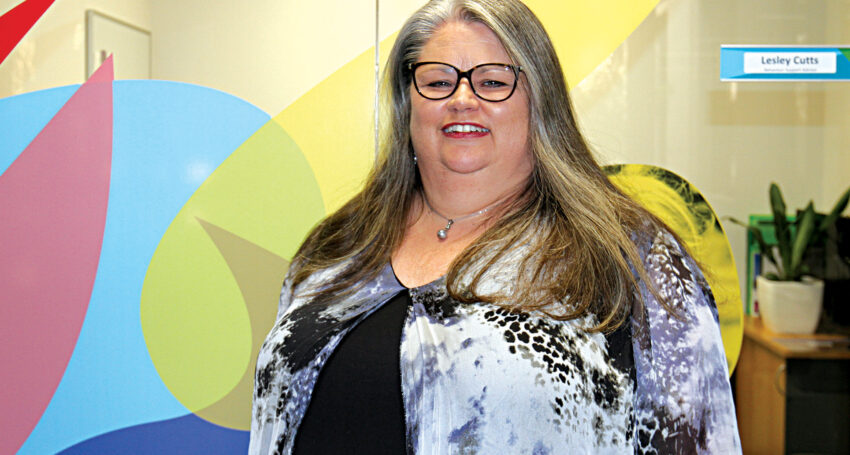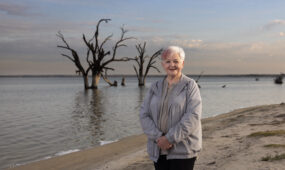Centacare focuses on choice in disability services
Local
Choosing how much sugar we have in our coffee or what to drink when we’re thirsty are choices that most of us take for granted.

For people living with disability, it’s not that simple. Often these basic choices are taken away from them, supposedly in their best interest.
Enter Lesley Cutts, a developmental educator who has worked in the disability sector for more than 30 years and is now the Behaviour Support Advisor at Centacare Catholic Family Services.
Lesley (pictured) is on a mission to ensure clients living in Supported Independent Living or participating in the Kolbe Cottage day options program to live as full a life as possible.
Advertisement
Her role is believed to be the only one of its kind in South Australia and is playing a big part in eliminating restrictive practices for Centacare clients, in line with regulations overseen by the NDIS Commission since 2019.
One of those clients, who we will call Lainie, had 12 restrictive practices applied to her behaviour when Lesley started the role in September 2022. Now she has six, and Lesley hopes there will be even fewer in the future. One of those restrictions was making her morning coffee. Now she not only puts sugar in her coffee, she eats another spoonful. She also can operate the cupboard lock to choose her snacks.
According to the NDIS legislation, restrictive practices are defined as any practice or intervention that has the effect of restricting the rights or freedom of movement of a person with a disability. While these restrictions are sometimes needed to ensure safety of the client and/or staff, Lesley is passionate about reducing and eliminating them from the 31 Behaviour Support Plans currently in place at Centacare Catholic Family Services.
With more than 20 Behaviour Support Practitioners from 19 different organisations writing plans for Centacare clients, a major part of Lesley’s role is as the link between them and the Centacare staff who have to translate and implement the plans.
“I don’t know of any other organisation doing that,” said Lesley, who also is responsible for compliance.
“It’s proven to have some great benefits in terms of staff understanding Behaviour Support Plans and being able to get hold of me if a practitioner is not available to work through and trouble shoot.”
Lesley said the “struggle” for staff was their own values. For example, there are a couple of clients who often want to drink a soft drink, and some staff might want to restrict this choice.
“It generally comes from a place of care and compassion, the belief that it’s the right thing to do; but it’s their choice, just as it’s yours and mine.”
If there are concerns regarding the health impact of a client’s choice, Centacare works closely with the families, dieticians, and behaviour support practitioners to encourage other options.
Another example is that it can “be tricky” to introduce changes or stop a medication when families have gone through traumatic times with behaviour at home.
Advertisement
“But they are living in Supported Independent Living now; we can talk to families, work with them, and say, can we try this?” she said.
“We just have to work through this on a case by case basis.”
Lesley highlighted the importance of understanding that any restrictive practice is an infringement on human rights.
“We should only use them if there’s a safety risk, for the person themselves or someone else,” she said.
“A good Behaviour Support Plan means the person is supported in the right way and they don’t need to use their behaviour to communicate their needs, because we’ve come up with other ways to do that.
“They don’t reach the point where they are at a level of distress where their behaviour impacts on them and the people around them, and we don’t need to resort to restrictive practices.”
There are five categories of restraint regulated by the NDIS Quality and Safeguards Commission: chemical, environmental, mechanical, physical and seclusion.
Chemical restraint might be putting someone on anti-psychotics without a formal diagnosis while environmental restraints include locking doors and gates or drawers with sharp objects.
Lesley said even low-level physical restraints, such as holding someone for medical procedures or nail-cutting, may be able to be eliminated.
Often it’s a matter of trialling the removal of a restraint and monitoring what happens.
“The kitchen gate is a really good example: when we unlocked it, we stressed that it was a trial and might not go smoothly,” she said.
“If there’s behaviour where someone is at risk then staff are quite entitled to shut the gate again. But they only need lock it for the duration of the behaviour.”
Initially staff were locking and unlocking the gate three or four times a day but the most recent statistics show that it was only locked and unlocked twice in February.
With five people living in that particular house, Lesley said to only lock the gate occasionally was “really, really nice”.
As a developmental educator, Lesley said she “naturally gravitated” towards working with people with behaviours of concern.
“I find it incredibly rewarding,” she said.
“Basically my understanding of behaviour is it’s just about communication; it always happens for a reason and usually the person is saying ‘I’m not doing what you want me to do, I’m going to do what I want to do’, and so there’s a bit of sass.
“It’s an area that’s always intrigued me and one I’ve been drawn to, I’ve had a really broad and varied background which has led me to this spot.”
As for her latest role: “I’m absolutely loving it,” she said.







